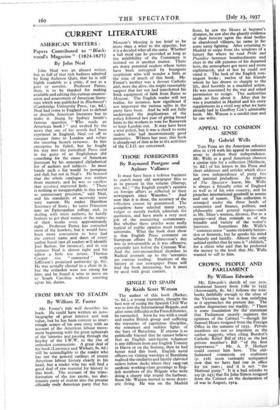SINGLE TO SPAIN By Keith Scott Watson
The author of this book (Barker, 7s. 6d.), a young journalist, thought the best way of seeing the Spanish Civil War was to join the International Brigade, and after some difficulty at the French frontier, he succeeded. Soon he was with a small and restive British group and suffering the mysteries of capricious discipline, the romances and sudden fights of the bars of Barcelona. If anyone is so politically biassed that he cannot believe that an English anti-fascist volunteer is any different from any English Tommy in Havre or on the Somme, then he had better read this book. English naval officers on visiting warships at BarCelona realised the similarity and hastily chivvied sailors below decks where they sang opt sardonic working-class greetings to Eng- lish members of the Brigade who were doing a cheery trip round the harbour. Soon Mr. Watson moved to more dram- atic living. He was on the Madrid front, he saw the Moors ai bakonet's distance, he saw also the ghastly evidence of their ferocity upon the dead bodies in abandoned villages, he came in for • some nasty fighting. After returning to Madrid to snipe from the windows of a luxury flat where he read Pride and Prejudice between bombardments and slept in the silk pyjamas of his departed host, the atmosphere got more and more nightmarish; and at last he could not stand it. The luck of the English con- tingent broke ; twelve of his friends whom he has drawn so sharply to the life, died horribly in a muddled action. He was nauseated by the war and asked permission to resign. The authorities made no fuss about it. After that he was a journalist in Madrid and his story supplements in a vivid way what we have already had in Geoffrey Cox's admirable book. Mr. Watson is a candid man and he can write.






























































 Previous page
Previous page